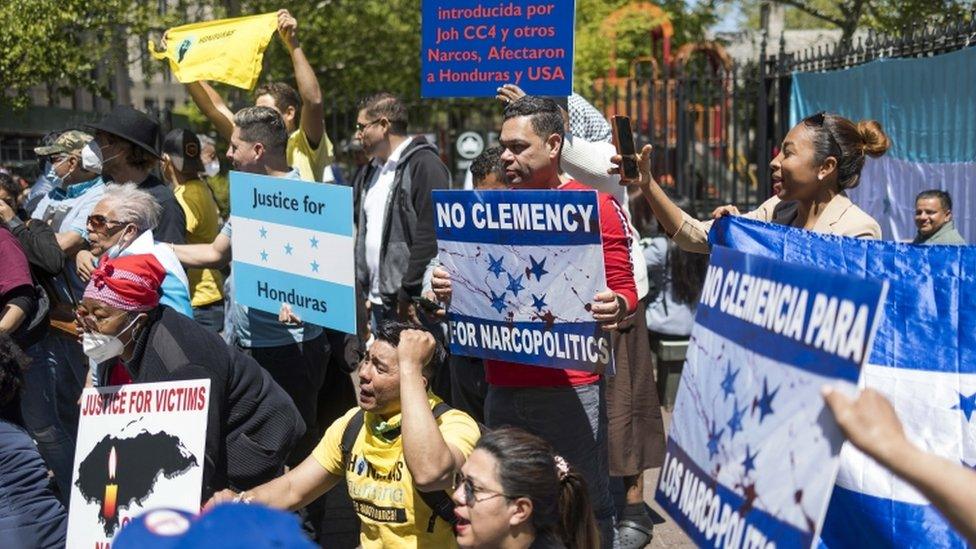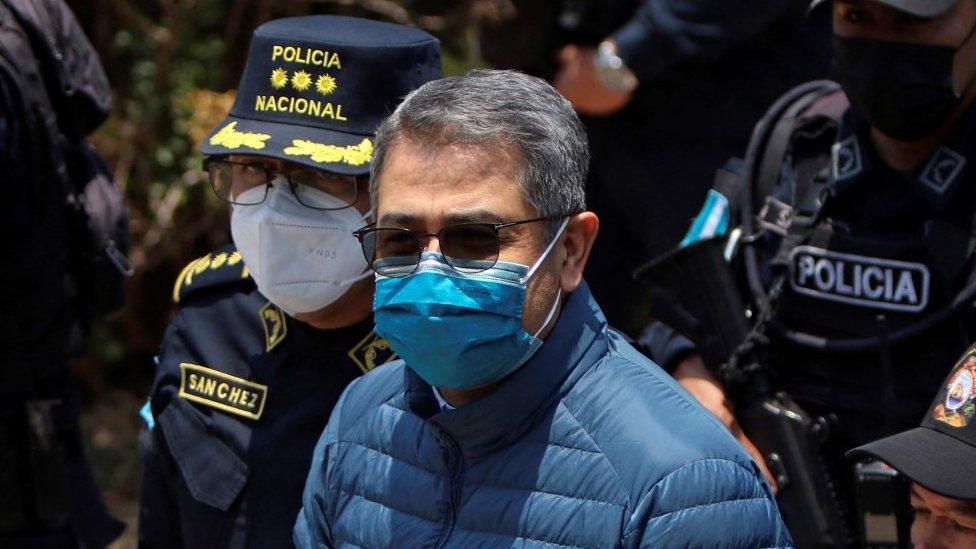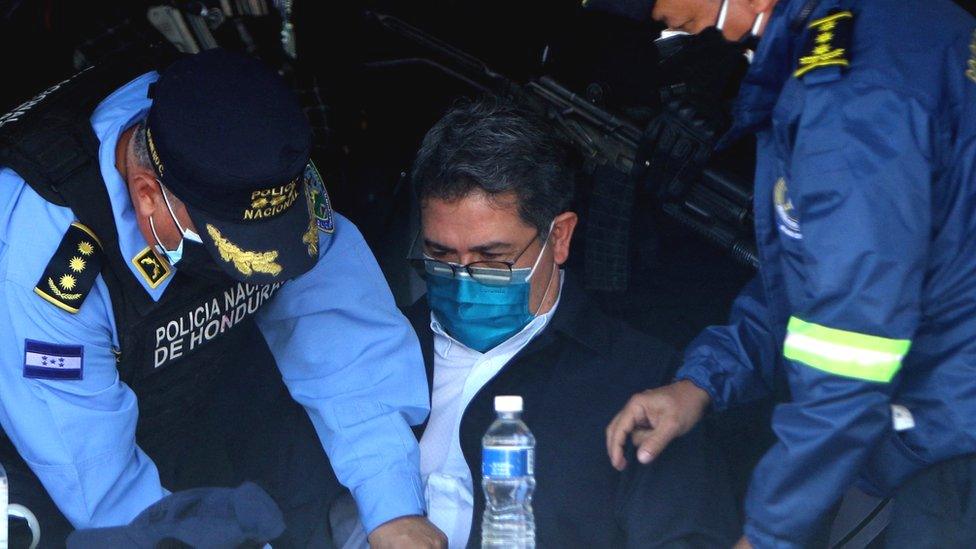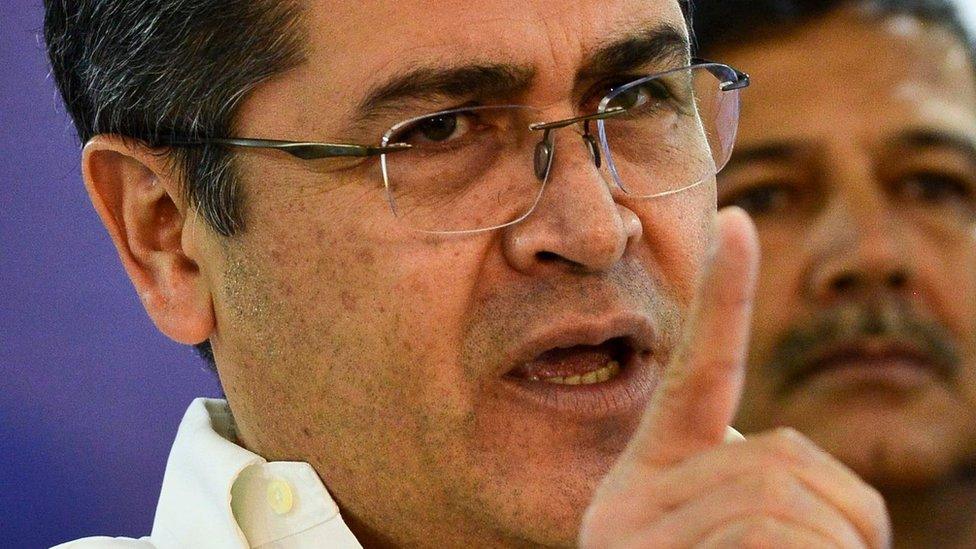Juan Orlando Hernández: Honduran ex-leader pleads not guilty
- Published

People gather in front of the United States federal courthouse where Mr Hernandez appeared on Tuesday
A former president of Honduras, Juan Orlando Hernández, has pleaded not guilty to drugs and weapons charges in a court in New York.
Mr Hernández, who governed the Central American nation until January, was extradited to the US on 21 April, less than three months after his second term in office ended.
The ex-leader has denied wrongdoing.
He says he is innocent and argues that disgruntled drug traffickers are trying to frame him.
In a Manhattan court on Tuesday, dressed in a dark-blue prison uniform with chains around his ankles, Mr Hernández only spoke to utter his not guilty plea in Spanish.
His lawyer, Raymond Colon, complained to the judge about the "inhuman" prison conditions faced by the former president, "as though he is a prisoner of war".
"We're not asking for him to get special treatment because he's a former head of state, but these conditions are psychologically debilitating," he said.
Mr Hernández, 53, is facing three criminal charges:
conspiracy to import a controlled substance into the US
using or carrying firearms including machine guns
conspiracy to use or carry firearms
Before the arraignment hearing, a lawyer for Mr Hernández described the case as a "vendetta masquerading as a prosecution".
But US prosecutors allege that the former president worked "with some of the world's most prolific narcotics traffickers to build a corrupt and brutally violent empire based on the illegal trafficking of tons of cocaine".
In their extradition request, US officials accused Mr Hernández of "participating in a violent drug trafficking conspiracy to receive shipments of multiple tonnes of cocaine sent to Honduras from Colombia and Venezuela and other locations by air or sea routes".
His legal troubles were triggered by the trial against his younger brother Tony, a former member of the Honduran Congress, who was sentenced to life in prison last year.
During Tony Hernández's trial in New York, prosecutors alleged that the infamous Mexican drug lord Joaquín "El Chapo" Guzmán had personally handed the younger Hernández $1m (£765,000).
According to the prosecutors, "El Chapo" told Tony Hernández to pass the money on to his older brother, Juan Orlando, to finance the latter's presidential campaign.
Juan Orlando Hernández is accused of having accepted millions of dollars in bribes during his eight years as president in exchange for protecting drug traffickers from investigation, arrest and extradition.


Juan Orlando Hernández has twice been named as a co-conspirator in drug-smuggling trials in the United States - including when his younger brother, Tony, was sentenced to life plus thirty years in prison for bringing tonnes of cocaine into the US.
Now the former Honduran president faces a similar fate unless he can convince the court that he was not only unaware of his brother's criminal activities but also completely uninvolved in them while in office. His defence began in an obvious fashion: pleading not guilty in a Manhattan courtroom.
It is increasingly clear that his defence team plan to go on the offensive, presenting Mr Hernández as a key ally in Washington's battle against the drug cartels who has been grievously wronged for the work he did to dismantle organised crime networks in his country.
His defence team has repeatedly said the entire case against him is a conspiracy orchestrated by disgruntled criminals. And there are suggestions his lawyers could even call President Obama, President Trump and President Biden to testify on Mr Hernández's role in the so-called "war on drugs".
It is a bold strategy. But it's far from clear it will work. He was extradited from Honduras accused of running a "narco-state" in Honduras and faces an uphill battle in disproving that.
Related topics
- Published22 April 2022

- Published15 February 2022

- Published3 October 2019
